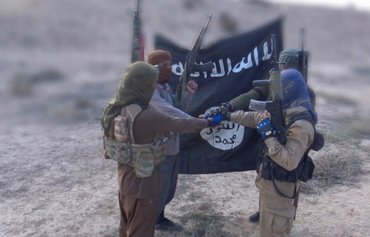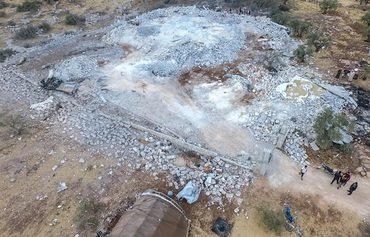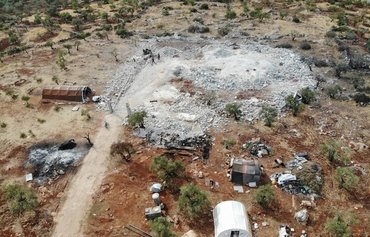CAIRO -- The failure of the "Islamic State of Iraq and Syria" (ISIS) to announce the name of a fifth "caliph" after Türkiye claimed its forces had killed the fourth is indicative of the group's debility, experts told Al-Mashareq.
The inability of the group's remaining leaders to agree on a successor -- or even confirm or deny the death of the most recent one -- will diminish its credibility among its supporters and potentially trigger an exodus of its fighters, they said.
"ISIS has been led by four caliphs so far," Cairo-based Iraqi journalist Ahmed al-Khazaali, who specialises in terrorist groups, told Al-Mashareq.
Of these, three have been killed, as confirmed by the United States and by ISIS, including the group's first leader, Abu Bakr al-Baghdadi, who led ISIS from 2014 until October 2019, when he killed himself by detonating a suicide vest.
![An ISIS element is seen here on December 15, after he was arrested by the Syrian Democratic Forces. [Syrian Democratic Forces]](/cnmi_di/images/2023/06/06/42451-caliph-isis-sdf-600_384.jpg)
An ISIS element is seen here on December 15, after he was arrested by the Syrian Democratic Forces. [Syrian Democratic Forces]
![A member of the White Helmets examines the wreckage of a motorcycle ridden by two ISIS elements who were targeted by a drone on June 12, 2022. [White Helmets]](/cnmi_di/images/2023/06/06/42452-caliph-white-helmets-600_384.jpg)
A member of the White Helmets examines the wreckage of a motorcycle ridden by two ISIS elements who were targeted by a drone on June 12, 2022. [White Helmets]
Al-Baghdadi blew himself up in an underground tunnel, along with two children who appeared to be under the age of 12, during a US special forces raid on his hideout in Syria's Idlib province.
Al-Baghdadi's successor, Abu Ibrahim al-Hashemi al-Qurashi, blew himself up during a US special forces raid on his hideout near Atme in northwest Syria, killing members of his family with him, in February 2022.
His successor, Abu Hasan al-Hashemi al-Qurashi, blew himself up as local factions in Syria's Daraa province besieged his hideout last October.
Who is leading ISIS?
On April 30, Turkish President Recep Tayyip Erdogan announced that Turkish forces had killed the group's fourth leader, Abu al-Hussein al-Husseini al-Qurashi, in a special operation in northern Syria.
The statement did not include the date of the operation, al-Khazaali noted.
Additionally, he said, "despite the passage of more than a month, no announcement has been made by the group about his death or the name of the new caliph, with a call to pledge allegiance to him".
The group typically makes an announcement when its top leader is killed, he said, "and within days a new caliph would be announced with a call to pledge allegiance to him".
But this has not happened, he said, noting that the United States has not confirmed the death of the fourth "caliph".
The very lack of information has fuelled mistrust in extremist ranks.
"In addition to doubts about [the fourth caliph's] death, the reason [for the lack of an announcement] may be the lack of agreement among the remaining leaders of the group on the name of the successor," al-Khazaali said.
The naming of a successor is under the purview of the group's Shura Council, he said, and it is expected that a statement would be issued, in which the name of the new caliph would be announced and the pledge of allegiance demanded.
A delay in announcing the name of a successor "will harm the group and undermine its reputation and what remains of its strength", he noted.
Highly unusual
It is highly unusual that the top leader of an extremist group would be killed "with no successor announced, or at least a denial of his death in an audio recording or the like", said terror group specialist Wael Abdul Muttalib.
If this is indicative of anything, he told Al-Mashareq, it is the current weakness of the extremist group and its loss of the power to establish ties between the remaining elements and emirs.
This will naturally lead to the remaining elements leaving to join other extremist groups and pledging allegiance to their leaders, he said.
Abdul Muttalib noted that the pledge of allegiance is essential for these groups, "and it represents loyalty among the fighters".
"Without it, jihad is meaningless, according to their beliefs," he said.
In addition to the jolt to the fundamental structure of the group, Abdul Muttalib said "it will be a jolt to the group's prestige among civilians in the areas of its presence", as it will lose its credibility and influence and the power with which it threatened them.
No true candidates left
"Even if ISIS announces the name of its new successor, it is expected that he will not win universal allegiance, unlike his predecessors," said Egyptian strategic analyst and terror group expert Yahya Mohammed Ali.
"Most of the first-line leaders have been killed, and there is no prominent extremist name left that has such support," he said.
"As for the new leaders, because the group is fragmented and scattered across a number of areas, their ability to control the rest of the leaders is very weak," he added.
It is therefore anticipated that the group's strength will diminish to its lowest levels yet in the weeks and months ahead, he said, and that its elements will not be able to carry out any notable attacks because of this weakness in leadership.
There has been close to no ISIS media activity on social media, said Mazen Zaki, director of the Ibn Al-Walid Centre for Studies and Field Research's new media department.
The exception has been one single issue of ISIS's propaganda newspaper, al-Naba, that included some ordinary news published by the mainstream media, he told Al-Mashareq.
Most of the news relates to the group's activity in Africa, he said, noting that "even the design itself is very ordinary, and was produced with modest capabilities by people who are not professionals".








